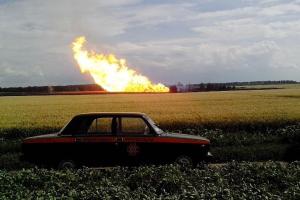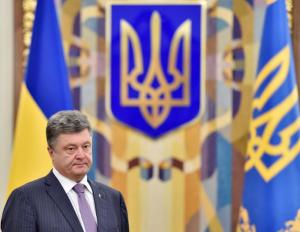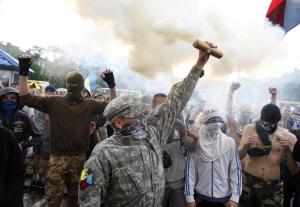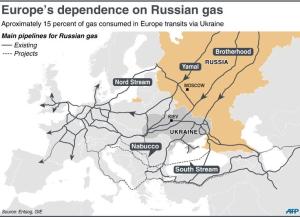Kiev (AFP) - Russian President Vladimir Putin and his Ukrainian counterpart Petro Poroshenko held talks on Tuesday over a possible ceasefire in Ukraine, as two members of a Russian television crew were killed in the ex-Soviet state's separatist east.
Poroshenko assured Putin that an investigation would be launched into the deaths, and vowed to take necessary measures to protect reporters covering the conflict, the Kremlin said in a statement following the talks.
"The issue of a possible ceasefire in the area of a military operation in Ukraine's southeast has been touched upon," the Kremlin said.
Moscow had earlier responded furiously to the death of the TV crew members, accusing Kiev of a campaign of "terror" and demanding an investigation.
The explosive nature of the two sides' relations was also in full view Tuesday when a vital pipeline used to transport Siberian gas to Europe exploded in a spectacular fireball that sent up a 30-metre (100-foot) flame.
The blast appeared to have been caused by the loss of pressure in a seal in a part of the link running through a northeastern part of Ukraine, but Kiev blamed it on Russian "sabotage".
View gallery

This handout picture taken and released by the Ukrainian Emergency Service on June 17, 2014 shows a …
Igor Kornelyuk, a reporter with Russia's VGTRK media group, sustained severe stomach wounds when he was hit by shrapnel after being caught in an attack by Ukrainian forces in the Russian border region.
"He was unconscious when he arrived and died on his way to the operating room," Fedir Solyanyk, chief doctor at the main hospital in the rebel stronghold city of Lugansk, told AFP by telephone.
VGTRK sound technician Anton Voloshin, who was earlier thought missing, was later confirmed to have died in the same attack.
Voloshin's body was found by Ukrainian rebels at the site of the attack and identified by his colleague, a cameraman who was filming the attack but escaped uninjured, Russian television said.
Russia's Investigative Committee said it had opened an investigation into the deaths, while the Russian foreign ministry demanded that Ukraine follow suit.
View gallery

Ukrainian President Petro Poroshenko arrives for a National Security and Defence Council sitting in …
"We demand that Ukraine's authorities conduct an objective investigation of this tragedy and strictly punish the guilty," the ministry said in a statement, accusing the Kiev authorities of "unleashing veritable terror against journalists from Russia".
The two TV crew were the first Russian media workers confirmed to have died in eastern Ukraine since fighting there broke out in mid-April.
Italian photographer Andrea Rocchelli and his Russian assistant Andrei Mironov were killed outside Slavyansk in the neighbouring Donetsk region in late May.
Reporters Without Borders said the violence affecting journalists in Ukraine had reached "unprecedented levels" and called for a "full and impartial investigation" into the deaths.
The 10-week pro-Russian uprising has threatened the survival of the economically teetering ex-Soviet nation and put East-West relations under pressure not seen since the Cold War.
View gallery

Protesters during rally against Russian President Vladimir Putin in front of the Russian embassy in …
- Russian gas cut -
The Kremlin, which denies fomenting the unrest, on Monday cut off the supply of gas in a move Kiev called "another stage of Russia's aggression against the Ukrainian state".
Russia imposed the cut after Ukraine balked at making a $1.9 billion (1.4 billion euro) debt payment in protest at Moscow's decision to nearly double Kiev's rates in the wake of the February ouster of a Kremlin-backed president.
Weeks of acrimonious debt and price negotiations broke up on Monday with Russia walking away from a compromise solution proposed in Kiev by the European Union's energy commissioner.
Ukraine receives half its gas from Russia and transports 15 percent of the fuel consumed in Europe -- a dependence that has not diminished despite similar supply disruptions in 2006 and 2009.
View gallery

Map of Europe showing pipelines carrying Russian gas through Ukraine, and pipelines than circumvent …
A gas shortage is not expected to be felt in either Ukraine or Europe for several months.
Ukraine has bolstered its underground storage volumes and analysts believe that Europe's own reserves are nearly full.
Yet Kiev is seeking to devise a longer-term solution that would eliminate a need to maintain an alliance with Russia to secure gas prices it can afford.
Prime Minister Arseniy Yatsenyuk said Tuesday that a team headed by Naftogaz state energy firm chief Andriy Kobolev and Energy Minister Yuriy Prodan was flying to Budapest to negotiate "reverse-flow" deliveries along pipelines now used for transporting Russian gas westward.
European utilities have for the most part refused to compromise their relations with Russia's energy giant Gazprom by selling its own gas back to Ukraine at a price lower than that imposed on Kiev by Moscow.
View gallery

An employee at a gas metering station near the Chaslivci village on May 21, 2014 (AFP Photo/Alexande …
European companies "do not have the right to do that," Gazprom chief executive Alexei Miller said.
But EU Energy Commission spokeswoman Sabine Berger said such "reverse-flow" deliveries were "legally perfectly sound".
- Russian 'sabotage' -
The gas cut has further exacerbated tensions with Kiev after Moscow's March seizure of Crimea and move to mass troops on its border with Ukraine.
On Tuesday, acting Interior Minister Arsen Avakov -- an outspoken official who has made a recent series of unsubstantiated claims -- called the explosion at the Trans-Siberian Pipeline Russian "sabotage".
"We are considering several versions of events, including the main one -- an act of terrorism," Avakov said in a statement.
"The pipeline's sabotage... is an another attempt by Russia to discredit Ukraine as a partner in the gas sector."